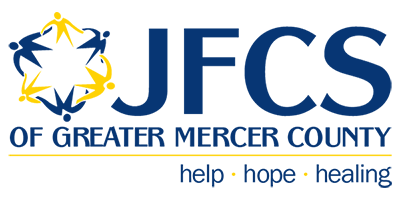Each year, May is designated as Mental Health Awareness Month to shine a light on the importance of mental health care – something we have all recognized over the past two difficult years. This year’s theme is “Together for Mental Health.”
What does it mean to be together for mental health?
At JFCS, we are united in the belief that mental health care has a place in all programs and services; and, with counseling being one of our core programs, our agency has a responsibility to promote mental healthcare to the community, provide resources, and join in the push to end the stigma surrounding mental healthcare and mental illness.
In February, we shared a video that highlighted our specific mental health services – the counseling department as well as support groups. Yet we are tuned into the emotional and psychological needs of all we serve, from the families using our food pantry, to the seniors receiving geriatric care management, to the youth participating in our programs.
Counseling Department
Is it helpful to have internal resources to refer your client, for more well-rounded mental health support?
Having internal access to agency resources to refer to clients, such as the food pantry, is an invaluable resource to offer to clients due to food insecurity rates that have significantly increased for many families due to the pandemic. Clients have provided great feedback and a sense of gratitude for having the ability to access nutritious foods in a dignified manner that normalizes the community’s need for the use of an agency food pantry.
Furthermore, being a part of agency that offers group workshops and marital counseling allows clients to gain access to these services without having to contact an outside agency and having to experience long waitlists elsewhere. Having accessibility for the aforementioned agency resources, allows me to meet client needs in an effortless manner and reduced time spent on case management services.
~Arlene Munoz, LSW Bilingual Social Worker
It is helpful because once the client has built trust and rapport with their social worker, they will be comfortable utilizing another reputable JFCS service. Having the ability to access identified resources within the Agency removes barriers when coordinating services.
~Shirley Bellardo, LCSW, LCADC Director of Clinical Services
How important is mental health sensitivity in your program?
Each client reacts to situations in their own unique way. Our social workers have the required sensitivity and understanding to support a client with diverse interventions that best suit their needs.
~Shirley Bellardo, LCSW, LCADC Director of Clinical Services
Food Programs
How does mental health play a role in your program?
We know that food insecurity = stress and anxiety. Imagine not having enough food for you or your family? The JFCS Mobile Food Pantry truck and our onsite pantry offers a bit of mental health support by providing much needed nourishment – for the body and the soul.
~Beth Englezos, Manager of Hunger Prevention
Senior Services
How important is mental health sensitivity in your program?
Being aware of stressors and validating feelings is critical. Clients need to feel “heard” and not be embarrassed or judged when expressing feelings or describing circumstances that are challenging.
~Beth Hammer, LCSW Geriatric Care Manager
Is it helpful to have internal resources to refer your client, for more well-rounded mental health support?
It is essential to have both internal and external referral sources to give to clients. Knowing there are various agency and community resources available can ensure that individuals receive the appropriate assistance they may require.
~Beverly Mishkin, LCSW Director of Senior Services
Teen Programs
How does mental health play a role in your program?
Gesher LeKesher benefits the Mental Health of our Madrichim in a number of ways. We introduce many useful resources including JFCS and the Crisis Text Line if they or someone they know is struggling with Mental Health. Our teen leaders also lead a unit to the Talmidim on the topic of selfcare. Program participants also roleplay and discuss red flag mental health behaviors and ways to respond when a person you know is struggling with mental health.
~Celeste Albert, LCSW Coordinator of Teen Programs
Volunteering
What role does mental health sensitivity play in your program?
In order to be most effective, agency volunteers need to communicate with clients with an awareness and understanding that the client may be suffering from mental or emotional issues.
How does your program benefit clients’ mental health?
From delivering food to making check-in phone calls, every service that JFCS volunteers offer serves to improve the mental health of the client. They are also trained to note any changes or issues that may be of concern and immediately report back to the appropriate JFCS team member.
How does your program benefit volunteers’ mental health?
Research has repeatedly shown tremendous benefits to volunteers who spend time helping others. Time after time, JFCS volunteers arrive with positive energy and a willingness to do whatever is needed. Helping others surely proves to help oneself.
~Eden Aaronson, Coordinator of Volunteers & Community Programs




What can you do personally to rally behind the call for “Together for Mental Health”?
Visit the NAMI Mental Health Awareness Month Resource page to learn more. Help advocate for a better mental health care system, share your story to help inspire others and defeat the stigma around mental health care and mental illness, and learn more about mental health using their education resources.


